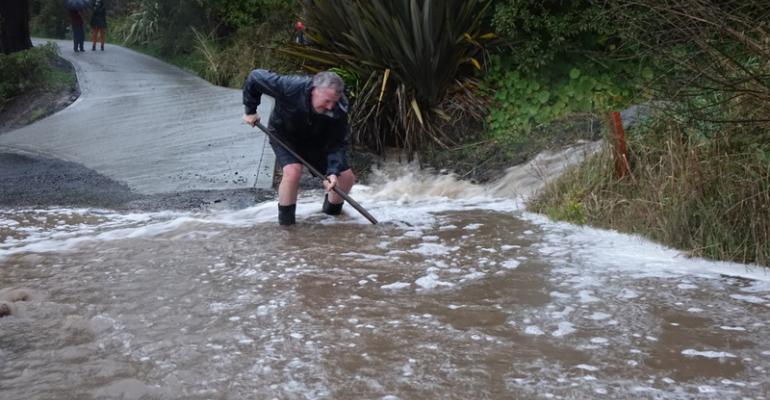October 23 2019
12pm-1pm
Location
Virtual hui | To participate via ZOOM, please register first by clicking the below link
DSC Seminar Series | Flood management in NZ: is it fair?

New Deep South Challenge research on flood management funding shows a need for a more coordinated approach between regional councils, particularly with more storms and sea-level rise on the horizon. This seminar with Patrick Walsh (Manaaki Whenua Landcare Research) will explore council-run “flood mitigation schemes” – both their effectiveness in reducing flood damage and whether they’re a fair way to manage flood risk.
Flooding is the most economically damaging natural hazard in New Zealand, and costs will only increase as climate change continues to cause more flooding. Local and regional councils are responsible for reducing the impact of flooding, by building stopbanks, for example, or by stabilising rivers through planting. Councils are also required to consider flooding when making planning decisions about new property developments.
Flood mitigation work is expensive and most councils top up their funds by encouraging property owners in flood-prone areas to institute a flood mitigation scheme. Neighbourhoods can also campaign to institute a flood scheme in their area. These schemes use targeted rates to fund additional flood management.
Yet council-run flood mitigation schemes do not benefit everyone equally. Property owners in less affluent communities are less likely to join voluntary funding schemes. These communities are also less likely to have the leverage or influence needed to lobby their councils about flood risks or flood protection.
With sea-level rise increasing both the extent of land threatened by flood, as well as increasing the damage in existing flood risk areas, these concerns will only increase over time. Without careful management, inequality could increase alongside increased flooding and sea-level rise.
About our presenter
Patrick Walsh is a senior economist with Manaaki Whenua Landcare Research (MWLR). Patrick leads MWLR’s Empirical Economics cluste, a team of environmental and agricultural economists working on applied economic research. Patrick specialises in applied econometrics and cost-benefit analysis and researches a range of environmental and natural resource economics issues, including water quality, invasive species, conservation, afforestation and natural hazards. Patrick previously worked at the US Environmental Protection Agency (EPA) in the National Center for Environmental Economics.
Physical hubs:
- Manaaki Whenua Auckland: Totoo Mauri Room*
- NIWA Wellington: VC Allen Board Room
- NIWA Christchurch: VC TerraNova Room
- NIWA Lauder: VC Computer Room
- University of Auckland: Room 301-411
- University of Canterbury: Meremere 411, School of Law Building
- University of Otago: VC Room 312, Physics Department
*Our presenter will be speaking from this hub.
Please note, all visitors to NIWA must sign in on arrival.
We encourage you to set up your own hub and bring colleagues together to participate in the seminar. Please let us know if you do set up your own hub and would like to test your VC facility prior to the seminar.